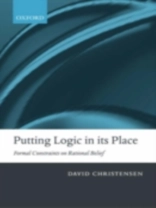What role, if any, does formal logic play in characterizing epistemically rational belief? Traditionally, belief is seen in a binary way – either one believes a proposition, or one doesn’t. Given this picture, it is attractive to impose certain deductive constraints on rational belief: that one’s beliefs be logically consistent, and that one believe the logical consequences of one’s beliefs. A less popular picture sees belief as a graded phenomenon. This picture(explored more by decision-theorists and philosophers of science thatn by mainstream epistemologists) invites the use of probabilistic coherence to constrain rational belief. But this latter project has often involved defining graded beliefs in terms of preferences, which may seem to change the subjectaway from epistemic rationality. Putting Logic in its Place explores the relations between these two ways of seeing beliefs. It argues that the binary conception, although it fits nicely with much of our commonsense thought and talk about belief, cannot in the end support the traditional deductive constraints on rational belief. Binary beliefs that obeyed these constraints could not answer to anything like our intuitive notion of epistemic rationality, and would end up having to be divorced from central aspects of ourcognitive, practical, and emotional lives. But this does not mean that logic plays no role in rationality. Probabilistic coherence should be viewed as using standard logic to constrain rational graded belief. This probabilistic constraint helps explain the appeal of the traditional deductive constraints, and even underlies the force of rationally persuasive deductive arguments. Graded belief cannot be defined in terms of preferences. But probabilistic coherence may be defended without positing definitional connections between beliefsand preferences. Like the traditional deductive constraints, coherence is a logical ideal that humans cannot fully attain. Nevertheless, it furnishes a compelling way of understanding a key dimension of epistemic rationality.
David Christensen
Putting Logic in its Place [PDF ebook]
Formal Constraints on Rational Belief
Putting Logic in its Place [PDF ebook]
Formal Constraints on Rational Belief
Achetez cet ebook et obtenez-en 1 de plus GRATUITEMENT !
Langue Anglais ● Format PDF ● ISBN 9780191532450 ● Maison d’édition OUP Oxford ● Publié 2004 ● Téléchargeable 6 fois ● Devise EUR ● ID 2273341 ● Protection contre la copie Adobe DRM
Nécessite un lecteur de livre électronique compatible DRM












